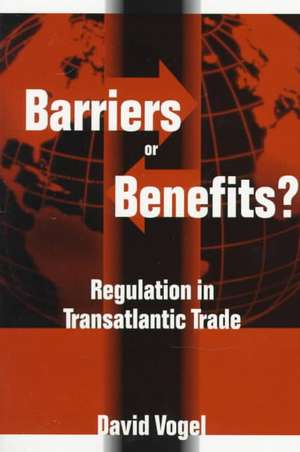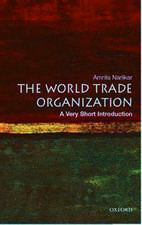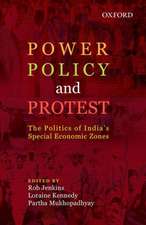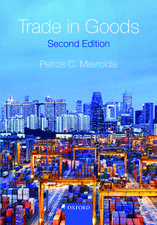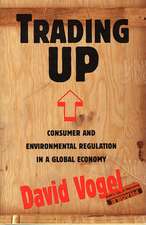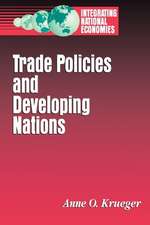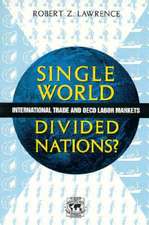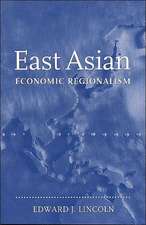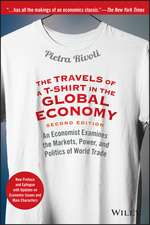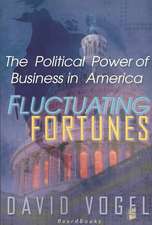Barriers or Benefits?: Regulation in Transatlantic Trade
Autor David Vogelen Limba Engleză Paperback – oct 1997
Government health, safety, and environmental standards have, in the past two decades, often created barriers to international trade. These non-tariff barriers have become the focus of trade disputes, negotiations, and agreements. This book explains the dynamics of conflict and cooperation over consumer and environmental regulation between the European Union and the United States. It explores the most celebrated cases of transatlantic conflicts over regulatory standards—the EU's beef hormone and legtrap bans, and America's fuel economy regulations—as well as the successes of the two partners in coordinating rules for chemical and drug testing, animal inspection, and the reduction of ozone-depleting chemicals.
David Vogel argues that transatlantic regulatory conflict has less to do with protectionism and more to do with deeply rooted differences in cultural values and political priorities in Europe and the United States. These differences, he explains, constitute a fundamental and ongoing source of trade conflict between the EU and the U.S.
The pattern of EU-U.S. regulatory relations has important implications, not only for the United States and Western Europe, but for the entire global economy. Whatever regulatory standards both adopt become de facto global standards. According to Vogel, the most important challenge for the U.S. and the EU is to promote and strengthen international regulatory cooperation. Each needs to pay more attention to their common interests in promoting international trade and improving global standards than to their often heated differences over particular consumer and environmental policies.
David Vogel argues that transatlantic regulatory conflict has less to do with protectionism and more to do with deeply rooted differences in cultural values and political priorities in Europe and the United States. These differences, he explains, constitute a fundamental and ongoing source of trade conflict between the EU and the U.S.
The pattern of EU-U.S. regulatory relations has important implications, not only for the United States and Western Europe, but for the entire global economy. Whatever regulatory standards both adopt become de facto global standards. According to Vogel, the most important challenge for the U.S. and the EU is to promote and strengthen international regulatory cooperation. Each needs to pay more attention to their common interests in promoting international trade and improving global standards than to their often heated differences over particular consumer and environmental policies.
Preț: 153.73 lei
Nou
Puncte Express: 231
Preț estimativ în valută:
29.42€ • 30.68$ • 24.45£
29.42€ • 30.68$ • 24.45£
Carte tipărită la comandă
Livrare economică 21 martie-04 aprilie
Preluare comenzi: 021 569.72.76
Specificații
ISBN-13: 9780815790754
ISBN-10: 0815790759
Pagini: 80
Dimensiuni: 152 x 229 x 7 mm
Greutate: 0.15 kg
Ediția:New.
Editura: Brookings Institution Press
Colecția Brookings Institution Press
Locul publicării:United States
ISBN-10: 0815790759
Pagini: 80
Dimensiuni: 152 x 229 x 7 mm
Greutate: 0.15 kg
Ediția:New.
Editura: Brookings Institution Press
Colecția Brookings Institution Press
Locul publicării:United States
Notă biografică
David Vogel is the Solomon Lee Professor of Business Ethics at the Haas School of Business and professor of political science at the University of California, Berkeley. His books include Kindred Strangers: The Uneasy Relationship between Politics and Business (Princeton, 1996); and Trading Up: Consumer and Environmental Regulation in a Global Economy (Harvard, 1995).
Descriere
Government health, safety, and environmental standards have, in the past two decades, often created barriers to international trade. These non-tariff barriers have become the focus of trade disputes, negotiations, and agreements. This book explains the dynamics of conflict and cooperation over consumer and environmental regulation between the European Union and the United States. It explores the most celebrated cases of transatlantic conflicts over regulatory standards—the EU's beef hormone and legtrap bans, and America's fuel economy regulations—as well as the successes of the two partners in coordinating rules for chemical and drug testing, animal inspection, and the reduction of ozone-depleting chemicals.
David Vogel argues that transatlantic regulatory conflict has less to do with protectionism and more to do with deeply rooted differences in cultural values and political priorities in Europe and the United States. These differences, he explains, constitute a fundamental and ongoing source of trade conflict between the EU and the U.S.
The pattern of EU-U.S. regulatory relations has important implications, not only for the United States and Western Europe, but for the entire global economy. Whatever regulatory standards both adopt become de facto global standards. According to Vogel, the most important challenge for the U.S. and the EU is to promote and strengthen international regulatory cooperation. Each needs to pay more attention to their common interests in promoting international trade and improving global standards than to their often heated differences over particular consumer and environmental policies.
David Vogel argues that transatlantic regulatory conflict has less to do with protectionism and more to do with deeply rooted differences in cultural values and political priorities in Europe and the United States. These differences, he explains, constitute a fundamental and ongoing source of trade conflict between the EU and the U.S.
The pattern of EU-U.S. regulatory relations has important implications, not only for the United States and Western Europe, but for the entire global economy. Whatever regulatory standards both adopt become de facto global standards. According to Vogel, the most important challenge for the U.S. and the EU is to promote and strengthen international regulatory cooperation. Each needs to pay more attention to their common interests in promoting international trade and improving global standards than to their often heated differences over particular consumer and environmental policies.
